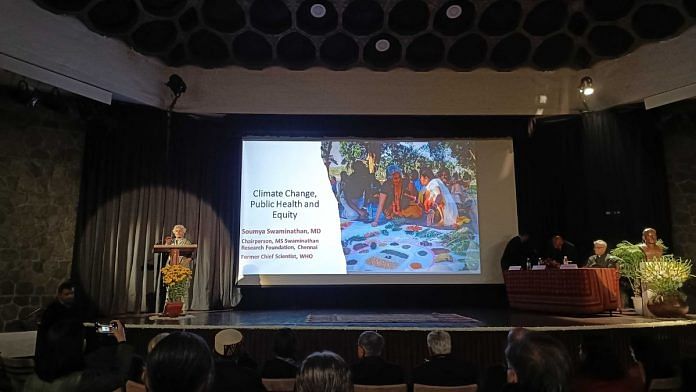Dr Soumya Swaminathan puts women at the heart of the climate change war. From ASHA and Anganwadi workers to auxiliary nurses and midwives, women are at the frontline of India’s primary healthcare system. And since these women are automatically the “first respondents” to climate change-induced health emergencies, they are also disproportionately affected by them, said Swaminathan, touching upon the ever-pressing issues of climate change, public health, and equity at the Dr CD Deshmukh Memorial Lecture in Delhi’s India International Centre.
As chief scientist of the World Health Organization (WHO), she guided countries during the peak pandemic period and got a global perspective on public health policies adopted by countries. Now, as chairperson of the MS Swaminathan Research Foundation in Chennai, she wants to expand the scope of research on climate change with inclusive solutions.
At the outset, Swaminathan acknowledged the world’s ‘existential battle’ against climate change. Health, according to her, is a key issue because rising temperatures, extreme weather events, and biodiversity loss primarily affect people and animals.
It’s only now that world leaders are acknowledging his intersectional relationship between health and climate change. Last year’s United Nations Conference of Parties (COP28) dedicated a day to discussions on public health within the framework of climate change for the first time. Swaminathan also pointed out how the effects of a changing climate are both direct (loss of lives due to extreme events) and indirect (crop damage, loss of clean water, and loss of livelihood).
“If we don’t act now, we are not going to remain happy inhabitants of this planet for much longer,” she stressed.
Climate change and inequality
As she sounded the warning bells, Dr Swaminathan also pointed out how these effects would not be equal for all of society. She drew on her experience at WHO to compare the two situations in terms of access to healthcare.
“Covid itself did not cause inequality, it just exacerbated the existing ones. Similarly, climate change, too, displays our societies’ social and structural inequalities,” she said.
Swaminathan drove her point home by citing the Global Climate Risk Index, which ranks countries based on their risk of extreme weather events, and the Lancet Countdown report, which tracks the health impacts of climate change.
“Low and middle-income countries are disproportionately affected by climate change events. Parts of Asia and Africa might become unlivable due to the increasing heat,” she said, referring to the reports.
But her talk went beyond international inequalities, focusing on how climate change affects people’s health and livelihoods. About 15 per cent of India’s population is moderate to very highly vulnerable to heatwaves. Who would be hit the hardest by this rising heat? “Agricultural workers, many of whom are women, and anybody that works outdoors in villages or cities,” Swaminathan said, answering her own question.
Air pollution, too, unequally impacts the poorer, underprivileged sections of society, Swaminathan added, showing a study published in Nature Journal in 2023 as proof. The researchers had found that harmful particulate matter and PM 2.5 levels were highest in areas with the highest prevalence of poverty. This suffering, moreover, wasn’t gender uniform — women always bore more adversities than men.
While the Lancet Countdown report mentions that women and children are more likely to be affected by air pollution and heat, Swaminathan also looked at the social reasons for women being burdened. “When poverty and climate disasters strike, women often get lesser nutrition and more responsibilities in households,” she said.
Also read: Is Qatar’s influence testing India’s diplomatic power? Delhi event decodes Doha’s power games
Investing in healthcare
Women need to lead the fight against climate change despite — or rather because of — these inequalities, said Swaminathan. Her visit to Odisha’s Koraput district made her realise that 90 per cent of the area’s primary healthcare providers were women.
“Be it as professionals or within the family, women are always called upon to respond to healthcare emergencies. It’s time we recognised them for it,” she said.
The healthcare system needs to be funded and strengthened to tackle climate change-induced health problems, Swaminathan asserted. She called for ‘political will’ to fight the socio-economic inequalities that exist in access to healthcare, along with “a multi-sector approach.”
“Governments should think of expenditure on healthcare as an investment. In humankind’s future.”
(Edited by Zoya Bhatti)



